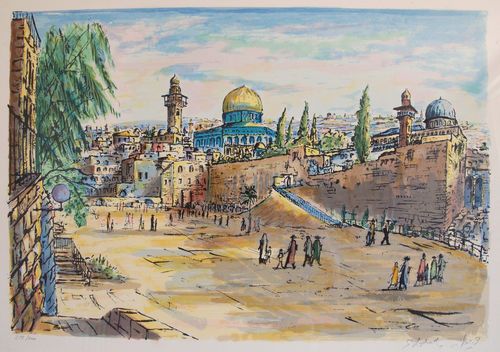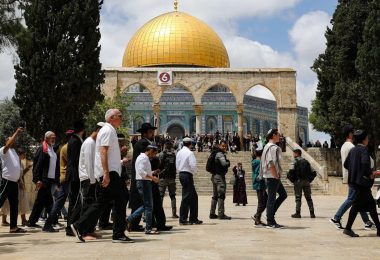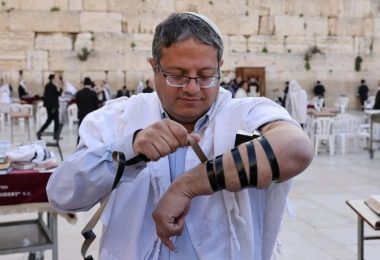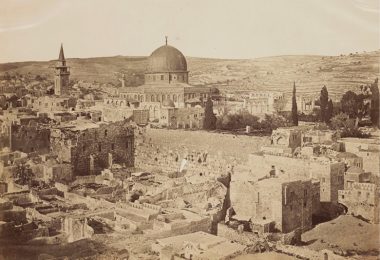As he frolics around his home on Jerusalem’s legendary Mount of Olives, Mustafa Abu Sway, like most Palestinians, has little room for maneuver. Towering over him and the besieged Palestinian neighbourhoods of the Holy City is Israel’s controversial Apartheid Wall – declared illegal by the International Court of Justice in 2004 – which, he intimates, forms a constant attack on his psyche. Then there are the checkpoints, the illegal settlements and Israel’s over-arching legislative control over so many aspects of Palestinian life – all of which compounds his sense of “psychological abuse.”
Still, the Associate Professor of Philosophy and Islamic Studies at the Al Quds University who has travelled widely, retains an keen eye for beauty. An East Jerusalemite since birth, Abu Sway tells me on a visit to South Africa that his heart is deeply wedded to the the Al Aqsa Mosque which lies at the heart of the Holy City. For him, even a trifling glance at the site of Islam’s third holiest place of worship is an exceedingly spiritual experience which can get his joy instantly reignited. “In the evening it is mesmerising to see from the slopes of the Mount of Olives the beautiful Dome of the Rock lighted, its just like a jewel, really. It’s not only the architecture, it’s something else. There is a certain beauty whilst you are still there, so I understand the Muslims longing towards the al Aqsa mosque and the desire to pray there. People are at peace, they love the mosque, they love Islam, they love the attachment their Prophet SAW had to this Holy mosque and this Holy land. In fact, this is the land of the Prophets, and with a little bit of imagination you can look into the past and perceive how different Prophets existed in this Holy city. It is mesmerising, it helps you to reflect on your life and what should be done in relation to the Akhirah. It’s a gift and even though from time to time you get distracted by what is happening in your normal life – but then you would remember that you have something beautiful. It is this beautiful space – you have sacred space, you have peaceful space. This is your resort.”

Mesmerising: The Dome of the Rock at night
The story of Abu Sway’s relationship with Al Quds is a long and tumultuous one. He explains. “When the war of 1967 took place, I was barely 10 years old and my father was out of the country. So my mother was the one who was making all the decisions on what to do. There were rumours that massacres were taking place in the fashion of 1948. That later proved to be untrue, but we ran away to Jericho and made it over into Amman immediately after the war. The (border) bridge was destroyed and there was a makeshift bridge in place. Until today, I don’t know how my father communicated with my mother – there was no email, sms or cellphones at that stage. We met at the makeshift bridge. My father even fell into the water. When Israel officially annexed East Jerusalem, my father realised that it was going to be a long story, so he smuggled us across the Jordan river at night. At one point when we spotted a military jeep we laid low on the ground for our safety. Eventually, we made our way back to Jerusalem on foot.”
More than 4 decades later, he is still haunted by the images of desperate Palestinian refugees he encountered in Jordan. “One man was trying to sell his watch probably to feed his family. (I saw) people who lost their homes, people who lost their jobs, people who were separated from loved ones, people whose family members were killed during the war. It was a very, very sad story, but you emerge from all of this strong and you try to build a life even out of the occupation. And you always hope that peace returns one day.”
Abu Sway is sometimes left distraught observing the internal fractures of Palestinian society and perceiving how the concentration of political power as well as solidarity efforts in the West Bank and Gaza have shifted the spotlight away from Jerusalem. “It was a big mistake that the PLO agreed to postpone the issue of Jerusalem until the end of negotiations. It is now so many years on and we see that we’re making no progress.”
He describes an Israeli policy of slow ethnic cleansing in Jerusalem, suggesting that it may be the only city in the world showcasing such institutionalised racism. “They continue to revoke the ID’s of East Jeruslamites. In 2008 they revoked the ID’s of more than 4500 Palestinians. Had they done this is one single day there would be an uproar all over the world. But they do this, in installments – (they keep a)low profile.”
“Unfortunately, Jerusalem is an orphan city with no caretaker,” he laments. “There is a certain weakness in the split, not only of the Palestinians, but also the Arabs, the Muslims. Jerusalem should be a universal issue. We talk about basic human rights that are being violated – people do not have access to their places of worship. Palestinian Muslims and Christians cannot come from the West bank to pray at Al Aqsa or the Churches of Jerusalem except with an Israeli permit. From the Gaza strip it is virtually impossible..”
In spite of all the deep wounds and disappointment, Abu Sway is not vengeful and maintains that Palestinians should guard their moral high ground. An international authority on the the works of Al Ghazali, his message to the oppressors of the Palestinians is characteristically sedate. “Jews have been persecuted in the past. They should be reminded that in as much as they suffered they should not inflict this suffering on others. They should not continue this cycle of violence. They should just take a moment and think about what they are doing. It is bad for us, but it is also bad for them. Ultimately a liberation of the Palestinians, is also a liberation of the Jews. and if we are destined to live together then this power structure is unsustainable and need to be deconstructed.”
He welcomes initiatives such as the now widespread Boycott, Divestment and Sanctions(BDS) platform, which he says has assisted in re-focusing attention on the Occupation, and the need to remedy it. He notes that Palestinians draw hope from people of goodwill all over the world recognising the plight of the Palestinian people and doing something about it.

Professor Mustafa in South Africa, 2012
Reminiscing again about that mesmersisng view from his hamlet on the slopes of the Mount of Olives, he observes that daily life for Palestinians is a pendulum between thankfulness and longing. “It has been a long story of suffering, decades of living under occupation. When I said I was a kid during 1967, I grew up under occupation, I finished my BA under occupation, my MA and Phd were in the USA, but I got married under occupation, we had children under occupation, and we had our first grandchild under occupation, Alhamdulillah for the grandchild, but you just simply think, I was hoping to have our grandchildren at least not under occupation, but in a condition where we are free. But that unfortunately wasn’t the case.”
This article first appeared on ciibroadcasting.com







